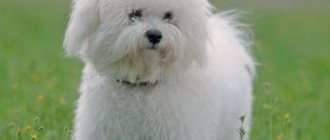welsh-corgi.by
Congratulations! A charming Welsh Corgi puppy has appeared in your home. How to care for a corgi puppy? are there any special features? Usually new owners have a lot of questions, and I will try to answer some of them in the article.
- Who can I ask how to properly feed, walk, and brush a Corgi puppy? Many new owners are embarrassed to call the breeder with these questions and use recommendations from neighbors and relatives. DON'T DO THIS unless your neighbor has been breeding corgis for the last 10 years. Contact the breeder. You won’t believe it, but selling a puppy is not “money in the evening, chairs in the morning.” This puppy is as dear to your breeder as it is to you. He raised him, knows a lot about him, can tell him a lot. A good breeder will not refuse to help you.
- After the move, the puppy is sad. Moving to a new home, being separated from your mother and siblings is stressful. To reduce it, ask the breeder to give you something from the “native smell” with a familiar smell: a toy, a diaper. Do not change your routine or introduce anything new (walks, food) for 1-3 days from the moment of moving. Let him get used to you and his new home. There may be whims and even “tears”, but, as a rule, this passes quickly and the corgi adapts to the new life. Try to be as patient and understanding as possible! Caress, hug, reassure your new family member. He needs a strong shoulder and a vest now.
- How to pick up a puppy? Only under the chest! Don't pull the puppy's paws or try to lift him up like that. At 2-3 months old, a Corgi is already quite heavy, and lifting it incorrectly can provoke aggression: the puppy is in pain and may bite you. Place your palm under the puppy's chest, place your middle fingers between the paws, and place your thumb and little finger on each side. Now you can lift it. If there are children in your house, explain it correctly or even explain that there is no need to pick up the puppy.
- DO NOT allow your Corgi puppy to jump off couches or from your hands. It's bad for him! His bones and ligaments are not yet strong enough to withstand such jumps without causing damage.
- A puppy is a curious creature with teeth . Don't underestimate the intelligence and curiosity of the Corgi. If a little cookie wants to get something, he will try to get it. To prevent “this” from harming the puppy itself, remove household chemicals and wires at a higher level, make the trash can and shelves with shoes inaccessible to the toothy researcher. Children's toys forgotten by a child on the floor can be mercilessly torn to pieces (good if they are made of soft plastic. Worse if they are made of brittle and brittle!). If you do not have the opportunity to lock your puppy in a separate room when leaving home, away from tempting shoes, toys, books and inlaid furniture, purchase a cage or pen and lock the puppy there while you are away.
- Corgi puppy needs toys. Your puppy will have a long period of teeth growth. First, these are baby teeth, then the replacement of teeth with molars and their growth. All this time, the puppy’s teeth itch and itch. He needs to chew on something. Buy him special toys: ropes, toys made of thick rubber. Homemade toys made from old rags work well (just tie knots from a rag, old socks, etc.). Many puppies consider raw carrots, cabbage stalks, cucumbers, potatoes, and apples to be the best toys. You can use store-bought treats: beef ears, trachea, etc. Old shoes are not suitable for play: the puppy will think that other, newer shoes and slippers can be chewed.
Funkyfox Ambition Boy
- Place: cage, bed, pen. Many people think that keeping a dog in a crate is cruel. Actually this is not true. Yes, keeping a dog in a cage around the clock, without walks, without even allowing it to stretch its legs, is cruel. But a spacious cage where your pet can go on vacation is convenient for both you and him. Corgis have an impressive undercoat, so choose a place away from heating appliances. It should not be on the walkway or at the front door (a vigilant dog may react violently to sounds from the entrance). The puppy should feel completely safe in its place. This is his shelter and fortress. Here you cannot punish, give injections, or give medications. From the first days, take the puppy to the crate when he starts to fall asleep. Soon the puppy will remember this and will go there himself. Crate training your puppy will greatly reduce damage to your belongings as teeth grow and change. You need to choose a bed or bedding for your corgi that is cool and easy to clean.
- about feeding
in some detail here - Vaccinations. By the time the puppy moves into your home, most likely, it has already had one vaccination and you only need to repeat the multi-vaccination. The most common vaccine is the Dutch Nobivac. She is vaccinated several times: at the age of 8-9 weeks and again at 12 weeks. 10 days before vaccination, give the puppy anthelmintic. This could be the common Drontal + or Prazicide, or any other anthelmintic suitable for dogs and puppies. Read the leaflet and give the drug according to the puppy’s weight. Anthelmintic must be given MANDATORY! Parasites greatly weaken the immune system, and if a weakened puppy is given a vaccine (essentially also undead microbes), the body may not cope. The consequences are very sad. If after anthelmintic you see worms in your stool, postpone the vaccination and drive away the parasites again after 10 days. Only a veterinarian can administer the vaccination. If your puppy has diarrhea, is lethargic, and doesn’t eat well, put off vaccination! The veterinarian is obliged to vaccinate the dog, having previously examined it, note the date of vaccination and the drug in the veterinary book, and put a stamp. Vaccination against rabies and leptospirosis is given no earlier than 12 weeks. Some people vaccinate it after the puppy’s teeth have been replaced with molars. But in case you need to take the puppy abroad, you need to vaccinate the puppy at 12-13 weeks and wait 21 days for quarantine. Only after this can you take your dog abroad. During the period of vaccination and quarantine, do not bathe or overcool the puppy! Monitor your baby's condition: on the first day after vaccination, he may be lethargic and eat poorly. This is fine. It is not normal if the puppy gets worse 3-5 days after vaccination. After the first vaccinations, revaccination should be carried out once a year.
- Walks. A puppy is like a child. He is interested in everything, he puts everything into his mouth. This is exactly what is dangerous. I recommend not walking your puppy until 2 vaccinations have been given and at least 10 days have passed after them. Immediately (1-3 days) after vaccination you CANNOT walk outside with the puppy! The immunity of breast milk has already passed, but its own (vaccine) immunity has not yet been developed. This is the most dangerous time when a small puppy is most vulnerable to all kinds of diseases. Especially in the city. Especially when in contact with other dogs. Hold off on walks. Health is more valuable. Please note: a walk is about communication between you and the puppy, playing together, doing activities, and not about the puppy interacting with other dogs. Until your Corgi knows basic commands and is trained to listen to you, limit his interactions with his own kind. This is the time to establish human-dog contact. Do not allow your puppy to pick up anything from the ground (bones, feces, carrion, bags of food)! It is very dangerous.
Care
Keeping a pet in an apartment or a private house is suitable, the main thing is to ensure regular walks and moderate physical activity.
To maintain your pet's health you need:
- hygiene;
- proper nutrition;
- disease prevention.
It is necessary to monitor the cleanliness of the oral cavity, hearing and vision. During the moulting period, comb the coat daily, and bathe the animal several times a year.
Feeding is carried out with natural products or prepared food containing the necessary vitamins and minerals. The dog is prone to overeating, it is important to follow the feeding regime and rules, and avoid snacking.
To prevent diseases, it is necessary to undergo routine vaccinations, deworming and other preventive measures against parasites.
With proper care, the pet's life expectancy will be 12 years or more.
Welsh Corgi breeds
The dogs were bred in Wales and are divided into two breeds. They're called:
- Welsh Corgi Cardigan;
- Pembroke Welsh Corgi.
Dogs of different breeds lived in neighboring counties, but did not intersect, so there were many differences between them.
Their similarities are only in their small stature, unusual short legs and peculiar ears, as well as in their wonderfully loyal character.
Cardigan is larger, stockier and his face, even in the photo, will remind you of a miniature shepherd dog. The Pembroke is not such an ancient breed as the Cardigan, it looks more aristocratic and sophisticated, a bit like a Spitz.
Photo of Welsh Corgi Cardigan
Their main difference is the tail. Cardigans have a long and wide tail, while Pembrokes have no tail or have one docked at birth.
Cardigan Welsh Corgi puppies behave more respectably and reservedly, they are very loyal. Pembroke puppies are very playful and friendly, more active.
It’s up to you to decide which breed you choose, but in any case, such a dog will become your reliable friend.
Where to buy a Welsh Corgi dog?
Welsh Corgi puppies should be purchased from professional breeders or from a kennel with an impeccable reputation. You may want to save money and buy a pet from a regular ad on the Internet, but be prepared for the fact that the puppy will not be a real corgi.
Photos of red Welsh Corgi puppies
A purebred dog with a good pedigree cannot be cheap. The price varies from 20,000 to 50,000 rubles.
In the corgi nursery, the puppies will be absolutely healthy and will receive the necessary vaccinations. You will be able to take your new four-legged friend home no earlier than he is three months old.
Diseases
Both puppies and adult dogs must be vaccinated against major diseases by a veterinarian. It is necessary to regularly drive away worms and protect the dog from dangerous pests: fleas, ticks and other parasites. It is always easier to carry out prevention than to eliminate the consequences later.
But among the diseases and health problems characteristic of this breed, the following can be identified: obesity; epilepsy; raw eczema; complicated childbirth, degenerative myelopathy; glaucoma; complete or partial displacement of the lens; ulceration of the cornea, etc.
However, all dogs, like people, are individuals and may not fall into generally accepted standards and characteristics. The dog will become a real family member, a caring friend for adults and children, and a skilled worker to help the owner.
Share link:
What do you need to have at home when purchasing a Welsh Corgi?
You need to prepare for the arrival of a Welsh Corgi puppy and purchase several things:
- a bowl for food and water;
- collar and leash for walking;
- several different toys;
- food recommended by the breeder;
Collar and leash for walking
- a house where the dog will sleep, or a sun lounger;
- brush or comb;
- flea remedy (if the dog was not treated for fleas at the kennel).
How to care for the Welsh Corgi breed?
Both Cardigan and Pembroke puppies do not require special care. The only problem you will encounter is the wool. Unfortunately, these dogs shed a lot and you will need to brush them frequently.
They should be bathed only when they get dirty, and after walking through the mud, you can simply wipe their paws with a damp cloth.
Inspect your pet's claws weekly and, if necessary, trim them with a special device - a nail clipper.
Nail clipper for dogs
Pay attention to the dog's eyes, they should be clean, without purulent discharge.
You will also need to clean your pet's ears and teeth. Under no circumstances should you trim your Welsh Corgi's coat. If you participate in exhibitions, you should know that the standard is the unaltered appearance of the wool.
Character and traits
The purebred representative is active, hardy, loves to run and frolic, cheerful, friendly, inquisitive, smart, his intelligence rating reaches a high level.
The dog loves to spend time with the owner, tries to amuse him, and at the same time, without imposing his communication, with a smiling face, he causes delight and tenderness. A corgi will make a loyal friend and everyone's favorite.
The attitude towards children is friendly, tolerant, even excessive children's attention does not cause aggression.
Despite their small size, dogs have fearlessness; this quality was inherited from their ancestors, who were not afraid to fight even with wolves. Males have a competitive spirit and can conflict with other dogs. Individuals bark loudly, like large shepherd dogs, and with their barking they can scare away an ill-wisher.
The upbringing of a ward should begin from puppyhood; with proper training, the puppy will quickly remember the nickname, learn commands, the main thing is to follow the sequence of training. A well-mannered dog is efficient, flexible, and will never cause trouble to its owner.
It is worth noting that, in general terms, a dog may have individual behavioral qualities.
Feeding the Welsh Corgi
To keep your four-legged friend healthy and vigorous, you need to carefully monitor his diet. Both Cardigans and Pembrokes can overeat and become overweight as a result. You, as a caring owner, should not allow this to happen.
From a young age, puppies should be taught not to beg for extra treats. Welsh Corgi dogs can be given natural products or special food, it is just important not to mix them.
This breed is best fed lean meat
If you decide to give your dog regular foods, you should know that your pet’s diet should include:
- lean meat;
- good quality cereals;
- eggs, offal, fermented milk products;
- vegetables;
- fish;
- as a treat - dog biscuits or a piece of cheese.
Welsh Corgi puppies need to be fed 4 times a day, and when the pet matures, they switch to two meals a day.
Dogs of this breed love fish meat
Origin story
The dog, a herding breed, is called the Welsh Corgi. Its origins go back to the tenth century. Homeland - Great Britain. They gained popularity during the reign of Queen Elizabeth, who loved these dogs very much. Before the queen noticed this breed, they were used as guards for the herd. Moreover, a shepherd was not always required. The dogs did a great job on their own.
They are considered the most loyal and are great for living in a small area. Corgis are easy to keep in a city apartment . Average life expectancy is up to fifteen years. Corgis much . Very sociable animals, they feel free in children's company. Corgis , like children , love to play and indulge.
Walking with Cardigans and Pembrokes
Welsh Corgi dogs love to go for walks. Be prepared for an active puppy to give you plenty of exercise. These doggies will need at least two walks a day, and preferably more.
Cardigans will behave more reservedly when walking, preferring your company and playing with you.
Pembroke puppies are very sociable and curious. They will want to get to know all the neighborhood dogs, cheerfully inviting them to play together.
Welsh Corgi puppies are incredibly cute and make wonderful photos, because these dogs are very photogenic.
Welsh Corgi dogs love to walk
Raising puppies
Corgis are famous for their high level of intelligence. They perfectly sense the mood of the owner and behave accordingly. A short-legged friend will not pester a person to play if he understands that he is not in a good mood. It is very easy to train pets, they pick up everything on the fly and remember commands literally 2-3 times. Experts recommend training your puppy from childhood. When training, you need to follow a few simple rules:
- be sure to reward your pet for completing tasks;
- do not swear, pronounce all commands in an even, calm tone;
- during training, be sure to take breaks for rest and active games;
- do not allow strangers to raise the puppy;
- immediately let your pet know who is boss in the house.
From the age of six months, a new family member should be taught the commands “fu”, “place”, “lie down”, “sit”. It is also important to teach the puppy to respond to its name. In children, the shepherd instinct can manifest itself in a funny way. They love to gather everyone into a “herd” and often carry objects from around the house in one pile. Sometimes the puppies even try to herd several people into a tight group by lightly biting their legs. This is how adult dogs herd cows to pasture.
Short legs did not cause dogs to be lazy or slow. At any age, animals love to run, jump, and swim. Walks are extremely important for these dogs. It is desirable that the dog has the opportunity to run and frolic in the open space at any time. However, living in an apartment will not be a burden for her.
It is important for the owner to know that jumping is contraindicated for Welsh Corgi puppies due to their body structure. They create too much stress on the fragile ligaments of the spine and joints. Therefore, if the baby is cheerful and starts jumping, then it is better to stop him.
Who can get a dog of this breed?
If you want a Cardigan or Pembroke puppy, then you will most likely have a few more questions. For example, if you have small children, should you get a Welsh Corgi dog? These pets are good for children, because they are very kind. Of course, you need to immediately tell the kids that a puppy is not a toy and in the future it is advisable to ensure that the rules of behavior are followed.
If you work from morning to late evening, then you should not take a dog home. A whole day alone will have a bad effect on his mental and physical development. In general, it is best to take two Welsh Corgis, it will be very interesting for the two of them.
Do you already have pets at home? This is not a problem for both Cardigans and Pembrokes. Welsh Corgis have a friendly character and usually have no problems with other pets. Therefore, a dog of this breed will become your best friend and companion.
Pros and cons of the breed
Corgis are pets that have many positive qualities. The advantages include:
- Small sizes. Corgi lives in an apartment without any problems, even if it is a studio.
- Good nature. They are moderately sociable and love their owners with all their hearts.
- Devotion to man.
- They can easily cope with changing places and moving.
- Smart.
As for the minuses, they are as follows:
- High price for purebred dogs. This is due to the great interest that has appeared recently.
- They eat a lot. The owner will have to carefully monitor the dog’s diet, otherwise it will get fat.
- Barks loudly - echoes of shepherd's work.
- Caring for a Corgi will require a lot of effort.











